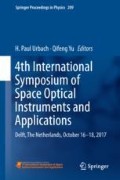Abstract
Dark signal is the non-negligible component of the CCD (Charge Coupled Devices) camera noise. The most straightforward way to eliminate dark signal is cooling the CCD chip. Moreover, the dark-signal image correction technique gets the more extensive application because of its lower development costs and better dark-signal correction effect. In this article, two methods for estimating the average of dark signals based on temperature and dark pixels are introduced, as well as the method for estimating the pixel nonuniformity of dark signal and for pixel-level dark signal correction. Experiment results show that the method in this article can achieve higher accuracy in dark-signal correction.
Access this chapter
Tax calculation will be finalised at checkout
Purchases are for personal use only
References
Janesick, J.R., Elliott, T., Collins, S., Blouke, M.M., Freeman, J.: Scientific charge-coupled devices. Opt. Eng. 26, 692–714 (1987)
Pan, C., Weng, F., Beck, T., Liang, D., Devaliere, E., Chen, W., Ding, S.: Analysis of OMPS in-flight CCD dark current degradation. In: IGARSS, pp. 1966–1969 (2016)
Li, Y.F., Li, M., Si, G., Guo, Y.: Noise analyzing and processing of TDI-CCD image sensor. Opt. Precis. Eng. 15, 1196–1202 (2007)
Chen, J., Zhang, Y., Liu, Y.: A CCD dark current auto-eliminating method. Sci. Technol. Eng. 15, 15–19 (2015)
Shu, P.: CCD pixel model and simulation. University of Electronic Science and Technology of China (2009)
Shang, Y., Zhang, J., Guan, Y., Zhang, W., Pan, W., Liu, H.: Design and evaluation of a high-performance charge coupled device camera for astronomical imaging. Meas. Sci. Technol. 20, 104002–104011 (2009)
Ma, B., Shang, Z., Hu, Y., Liu, Q., Wang, L., Wei, P.: A new method of CCD dark current correction via extracting the dark information from scientific images. Proc. SPIE 9154, 91541T (2014)
Janesick, J.R.: Scientific Charge-Coupled Device. SPIE Press, Bellingham (2001)
Su, L.: The simulation model of CCD Image Sensors. University of Electronic Science and Technology of China (2014)
Author information
Authors and Affiliations
Corresponding author
Editor information
Editors and Affiliations
Rights and permissions
Copyright information
© 2018 Springer Nature Switzerland AG
About this paper
Cite this paper
Li, C., Guo, Y., Zhang, F., Dong, F., Hu, Y., Dong, S. (2018). The Dark-Signal Real-Time Correction Method of CCD Digital Image. In: Urbach, H., Yu, Q. (eds) 4th International Symposium of Space Optical Instruments and Applications. ISSOIA 2017. Springer Proceedings in Physics, vol 209. Springer, Cham. https://doi.org/10.1007/978-3-319-96707-3_20
Download citation
DOI: https://doi.org/10.1007/978-3-319-96707-3_20
Published:
Publisher Name: Springer, Cham
Print ISBN: 978-3-319-96706-6
Online ISBN: 978-3-319-96707-3
eBook Packages: Physics and AstronomyPhysics and Astronomy (R0)

